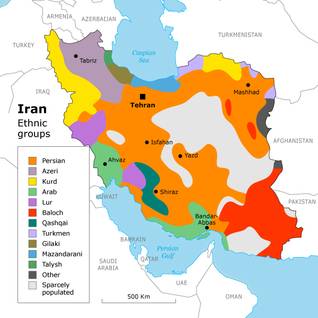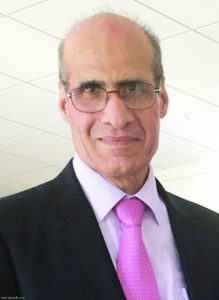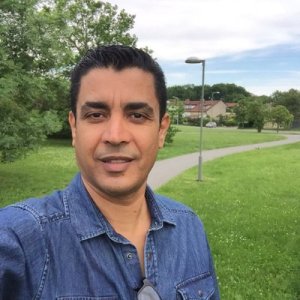The unity required to oust the current brutal theocratic regime in Tehran and to replace it with a modern, genuinely democratic, forward-looking system can only come from finally abandoning the regressive supremacist thinking which shapes this regime’s totalitarian mindset as it did the mindset of its predecessors. The PMOI has struggled for radical change in Iran for over half a century; as Ahwazi activists and supporters of justice for all peoples, we urge the party to acknowledge the failure of the current, outmoded, brutally enforced nation-state model which has failed for many decades to recognize all citizens’ rights to autonomy, liberty, and equality.
Leaders and members of the Iranian opposition party, the People’s Mujahideen Organization (PMOI) also known as Mujahedin e-Khalq or MEK, have reacted angrily to criticism of the organization’s discriminatory policies towards Iranians of non-Persian ethnicity after some Arabs and Ahwazis condemned the organization’s policies towards already oppressed minorities in Iran, who make up over half the country’s population.
In a number of articles published in recent days on news websites and in statements on social media, PMOI representatives have referred to Ahwazi Arab activists and supporters of Ahwazi freedom – among the people most brutally oppressed and subjected to racist persecution by the Tehran regime – as being agents of the Tehran regime. One example of this is an article published on the Madaen website by PMOI member Ali Qaimi in which he accuses Ahwazi freedom activists of being regime agents, claiming that their objective is to slander the ‘genuine opposition’ to the regime. Such grotesque and defamatory accusations against Ahwazi activists were made without any evidence, since none exists, adding insult to injury for Ahwazi people already routinely persecuted by the regime for their Arab ethnicity.
 While the Iranian regime routinely subjects Ahwazis and other ethnic minorities in Iran, including Kurds, Turkmen, and Baluchis, to brutal racist discrimination and persecution, in addition to its standard oppression and crushing of all dissent, the PMOI claims to oppose this systematic injustice and to represent the voice of freedom, justice and dignity for all citizens of Iran; unfortunately it fails to live up to this lofty aspiration, with some of its members instead repeating the same anti-Arab prejudice towards Ahwazis. This failure is causing many among the country’s Arab population to question the party’s commitment to replacing the current brutal regime with genuine representative democracy in which Ahwazis have equal rights and freedoms.
While the Iranian regime routinely subjects Ahwazis and other ethnic minorities in Iran, including Kurds, Turkmen, and Baluchis, to brutal racist discrimination and persecution, in addition to its standard oppression and crushing of all dissent, the PMOI claims to oppose this systematic injustice and to represent the voice of freedom, justice and dignity for all citizens of Iran; unfortunately it fails to live up to this lofty aspiration, with some of its members instead repeating the same anti-Arab prejudice towards Ahwazis. This failure is causing many among the country’s Arab population to question the party’s commitment to replacing the current brutal regime with genuine representative democracy in which Ahwazis have equal rights and freedoms.
Many Ahwazis, already aggrieved and alienated by such inflammatory and insulting statements from the PMOI, are also frustrated that the party is routinely represented in media as being the sole opposition to the Iranian regime while other opposition groups which represent the country’s ethnic minorities, as well as those of Persian ethnicity and which are involved in far more extensive opposition activities, are disregarded. A number of Ahwazi parties, as well as others representing Kurds such as the PJAK, Turkish parties such as the Azerbaijan Independence Party, and Balochi parties such as the Baluchistan Party, which work tirelessly for freedom and human rights, at great risk to their members in Iran, to help people in their own areas and in coordination with one another, have been flatly ignored, both by the PMOI and by its international supporters.
So long as the PMOI continues to mirror the ethnic supremacism of the current regime and its predecessors towards minorities in Iran and to disregard their legitimate calls for autonomy and self-determination, it will continue to be viewed as simply replicating their policies of oppression; Ahwazis, Kurds and other minorities who rose up once before in 1979 to win freedom from earlier oppressors have no desire to once again go through such upheavals simply in order to again replace one more oppressive, unjust and racist regime with another.
 Another example of the casual racism shown by the PMOI to Ahwazi Arabs in the aforementioned article by senior party member Qaimi was his insulting effort at cultural appropriation, dressing in traditional Ahwazi Arab garb – outlawed by the regime – for his byline photo in an effort to make himself “look Ahwazi” so that his offensive claims about Ahwazi activists might carry more weight; Ahwazi Arabs are routinely arrested for wearing their traditional Arab attire. Mr. Qaimi, a Persian Iranian, even described himself as a “writer of Ahwaz”, in an attempt to suggest that he is himself an Ahwazi Arab. This is akin to the famous white American woman Rachel Dolezal pretending to be African-American in order to pose as a black activist and to write from a first-person perspective about racism; at least in Dolezal’s case, however, she was not further insulting African-American civil rights activists by claiming that they were working in league with white supremacists; in Mr. Qaimi’s case, he used Ahwazi attire in support of an article slandering actual Ahwazi Arabs who are targeted by the regime for their ethnicity and cultural heritage.
Another example of the casual racism shown by the PMOI to Ahwazi Arabs in the aforementioned article by senior party member Qaimi was his insulting effort at cultural appropriation, dressing in traditional Ahwazi Arab garb – outlawed by the regime – for his byline photo in an effort to make himself “look Ahwazi” so that his offensive claims about Ahwazi activists might carry more weight; Ahwazi Arabs are routinely arrested for wearing their traditional Arab attire. Mr. Qaimi, a Persian Iranian, even described himself as a “writer of Ahwaz”, in an attempt to suggest that he is himself an Ahwazi Arab. This is akin to the famous white American woman Rachel Dolezal pretending to be African-American in order to pose as a black activist and to write from a first-person perspective about racism; at least in Dolezal’s case, however, she was not further insulting African-American civil rights activists by claiming that they were working in league with white supremacists; in Mr. Qaimi’s case, he used Ahwazi attire in support of an article slandering actual Ahwazi Arabs who are targeted by the regime for their ethnicity and cultural heritage.
This contemptible action by this writer and the grotesque slanders about Ahwazi activists contained in his article were crass, exploitative and wholly unethical and should be disowned by the PMOI if it wishes to restore its already battered credibility with the Ahwazi people.
Similarly to the egregious accusations made by Ali Qaimi, the head of the People’s Mujahedeen Organization, Dr. Snabrq Zahedi, issued a problematic statement addressing some aspects of suffering endured by ethnic minorities since the 1979 revolution. In his statement, he readily showed approval for Kurdish self-governance in Iran while ignoring Iranian regime atrocities committed against Arabs, such as the Black Wednesday Massacre in the Ahwazi city of Muhammarah. The PMOI has yet to publicly take a position on, let alone condemn, the horrors enacted upon Ahwazi Arabs by the Iranian regime. The PMOI has also taken no sure stance regarding the regime’s diversion of Ahwazi Rivers to Persian provinces that subsequently instigates demographic change when Arabs are forced to leave the depleted Ahwazi lands. The PMOI, like the regime, has also not addressed the April 15, 2005, Arab uprising in any real way, save in small mentions buried deep within their media releases.
 Zahedi asserted in this speech, seemingly without any clear understanding of the Ahwazi issue, that “the project to establish self-governance in Kurdistan, Iran should be a general framework for all non-Persian peoples.” He was even praised for this statement by the National Council on Kurdistan in particular. So it is therefore pertinent to ask: What does it mean to say that the framework of the self-rule used for the Kurdistan Region in Iran could be applicable to all non-Persian regions and ethnic peoples? What is this framework and how does it apply to Arabs, Baluchs, Turks, Turkmen, and other ethnic minorities?
Zahedi asserted in this speech, seemingly without any clear understanding of the Ahwazi issue, that “the project to establish self-governance in Kurdistan, Iran should be a general framework for all non-Persian peoples.” He was even praised for this statement by the National Council on Kurdistan in particular. So it is therefore pertinent to ask: What does it mean to say that the framework of the self-rule used for the Kurdistan Region in Iran could be applicable to all non-Persian regions and ethnic peoples? What is this framework and how does it apply to Arabs, Baluchs, Turks, Turkmen, and other ethnic minorities?
Is the objective of the Resistance Council, the political wing of the PMOI, to work on establishing a self-governing model for all peoples such as Arabs, Baluchs, Turks, Turkmen, and other ethnic minorities as was approved for the Kurds? If this is the intention, why has the PMOI not made any public announcement to that effect as of yet? Why has the PMOI not sought contributions to such initiatives towards other non-Persian peoples as they did with the Kurds? There is a saying that “doubt naturally comes before assurance” as based on the lengthy experiences of oppression and betrayal, the Ahwazi people cannot be assured of anything until concrete actions are taken to back up PMOI’s statements.
Previously, some members of the Ahwazi Party had attended a meeting with leaders from the People’s Mujahideen Organization. During said meeting, PMOI members stated bluntly that they will not accept autonomy for Ahwazi Arabs, as the circumstances of Kurdish autonomy are completely different. It would seem that the PMOI have taken a tolerant stance towards the Kurdish issue, perhaps in part to the preponderance of Kurdish people within their own forces during the Iran-Iraq war. This alliance seems to have facilitated a bridge for cooperation between the Kurds and PMOI. Another factor may be that the PMOI believes that Kurdish people belong to the Aryan race, which seems to have made it easier to accept their desire for autonomy above other ethnic minorities. Other than the aforementioned factors, there seem to be no other sensible reasons why the PMOI would support only Kurdish autonomy in Iran, which is still seen as “fragile and unreliable” according to Abdul Rahman Ghassemlou who was the iconic leader of the Kurdistan Democratic Party of Iran until his assassination in 1989 by individuals suspected of being agents of the Islamic Republic of Iran.
The unity required to oust the current brutal theocratic regime in Tehran and to replace it with a modern, genuinely democratic, forward-looking system can only come from finally abandoning the regressive supremacist thinking which shapes this regime’s totalitarian mindset as it did the mindset of its predecessors. The PMOI has struggled for radical change in Iran for over half a century; as Ahwazi activists and supporters of justice for all peoples, we urge the party to acknowledge the failure of the current, outmoded, brutally enforced nation-state model which has failed for many decades to recognize all citizens’ rights to autonomy, liberty, and equality. We are seeing the results of this systematically unjust and outmoded externally-imposed political model playing out tragically across the region as long-oppressed peoples, subjected for decades to injustice and oppression on the basis of sect, ethnicity, and faith, rise up for freedom and dignity, with assorted dictators and totalitarian regimes responding with further murderous oppression. The monstrous Iranian regime is central to efforts to ensure continuing tyranny regionally, as domestically. In order to succeed, the PMOI must incorporate the voices of all of the oppressed peoples in Iran, working as equals with Ahwazis and all other minorities to forge a new, mutually respectful political model, leaving the current, brutal and outmoded one in the dustbin of history where it belongs.
By Nouri Hamza, Ahwazi journalist and follower of Iranian affairs, you can follow him on Twitter: https://twitter.com/NouriAlhamzawi

Dear All,
It is complicated. Would you every now and then say something I can understand better.
I in the UK sort of understand it but not very well. I wish you well.
I feel so strongly about freedom of speech even though I am in a quandary where it stops.
Think, just thinking……….no help when good thinkers killed and locked up.
Something else, should we in the West stop freedom of speech for security?
Keep your good messages coming. I would never have heard about you until your emails.
We are so fat and comfortable in North Europe. Nobody understands the importance of democracy any more.
Yours
Bobby
Keep sending emails.
Sent from my iPad
Had not heard from you for a while so hope sort of ok with all of you.
Have no idea what it must be like for you. I do no think anybody in the West can. Keep in contact. Will try and say something about you at work. Most people in England do not know where Belgium is far less than Iran.
Regards
Bobby
Just thinking. Am in Uk. Not a bad place. Free.
I really hated the IRA.
Are you different? Is it a matter of degree?
There were things bad that happened in Ireland and UK but I think not as bad as happening with you and Iran.
Confused from Southampton.
Bobby
[…] rhetoric and tools are more modern. They are youth who refuse the traditional rhetoric, which is centralized and exclusive. They call themselves the Third Current. This growing tendency has an inclusive discourse that […]
[…] rhetoric and tools are more modern. They are youth who refuse the traditional rhetoric, which is centralized and exclusive. They call themselves the Third Current. This growing tendency has an inclusive discourse that […]